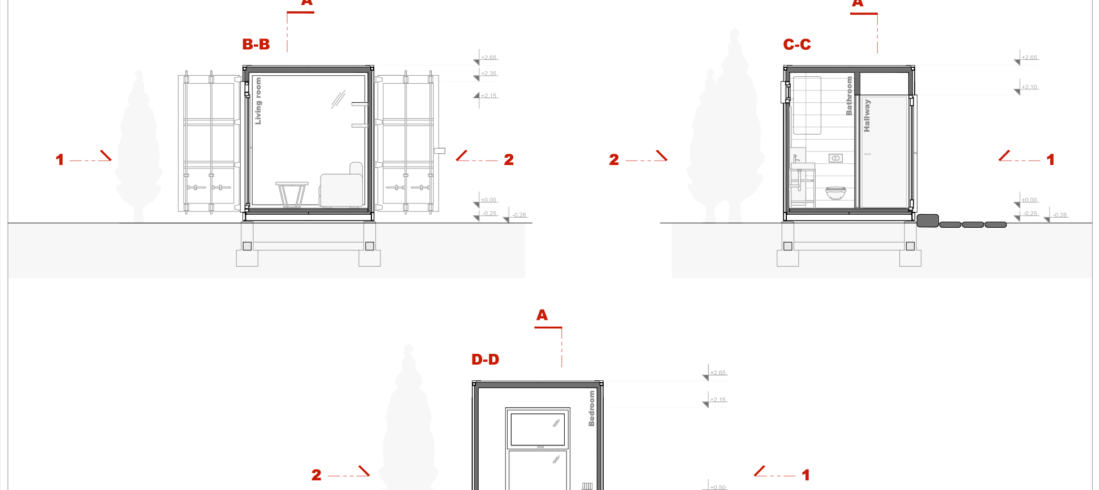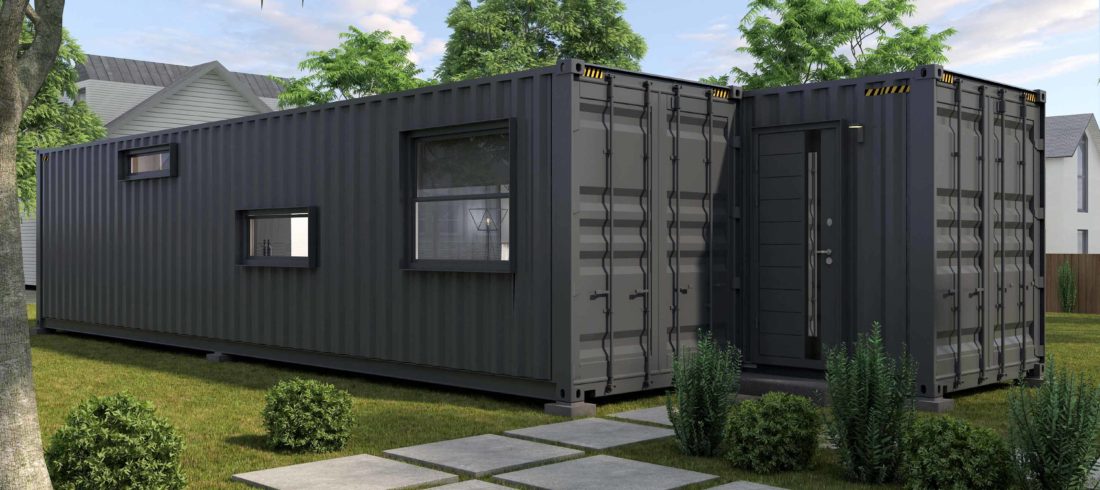Right now, roughly 20 million shipping containers are being carried across turbulent seas, facing extreme conditions to transport cargo across the globe. However, with approximately 11 million containers left unused and rusting, many have been adapted for a very different purpose.
People everywhere are realising that everyone can play their part in living a more sustainable lifestyle. Finding ways to upcycle existing materials is just one way in which we can reduce the impact of consumption by using less resources. Therefore, finding ways to repurpose materials that would otherwise be scrapped or melted down is the eco-friendly option.
New and innovative thinkers have found radical alternative uses for shipping containers, so let’s take a look at how thinking outside of the box has given them a second lease of life…
Are Shipping Containers Only Used Once?
Two of the main advantages of shipping containers is their durability and sustainability. They can be used to transport cargo for anything up to 12 years. After that, the ease with which they can be transported, customised, and upcycled means they can then be enjoyed as holiday homes, offices, garages, and much more.
Aside from their durability, shipping containers can be customised to suit a range of domestic and commercial purposes. They can be stacked and interlocked according to requirements to create structures of all shapes and sizes. Internally, they can be adapted to include all the basic demands of a traditional home or office space, with features like electricity, heating, lighting, plumbing, air conditioning and space-saving fittings and furniture.
So, whether you’re looking for an eco-friendly home or are considering cost-effective ways to start up a business, repurposed shipping containers could provide the solution. Once their life as cargo crates has ended, they needn’t be melted down or discarded. In fact, their second life is regularly proving to be even more interesting than what came before.
Most Common Uses for Shipping Containers
The only limits to uses for shipping containers are your imagination! Their versatility and uniformity has seen them being innovatively reused by creative minds everywhere. These metal marvels are now commonly adapted to have a new lease of life as shipping container homes, gyms, temporary housing, and, as we’re about to discover, much more in between:
- Shipping container homes: More cost-effective than bricks and mortar, shipping container houses let you escape the hustle and bustle of city life, reconnect with nature and live off grid.
- Shipping container restaurants: A trendy alternative to traditional eateries, shipping container restaurants are cheaper to set up, don’t require landlord fees, and can be designed and branded in limitless ways.
- Shipping container pools: Whiling away hot summer days in your very own pool is strictly for millionaires, right? With these industrial-chic container pools you can transform your garden into a blissful holiday spot for an affordable price.
- Shipping container gyms: Going to the gym every day takes dedication, time and money. If your reasons for not going are affordability and ease of access, a shipping container gym could be a big step towards a new you.
- Shipping container temporary housing: Rising homelessness and a lack of affordable housing has left an estimated 250,000 people sleeping rough in the UK. Shipping container temporary housing provides a comfortable and flexible solution for local councils.
If you want to know more about the mind-blowing alternative uses for shipping containers, you can read our blog here.
Additional Shipping Container Uses
The unique characteristics of shipping containers make them endlessly adaptable for use in a seemingly unlimited number of ways. Just when it appears that their potential has been fully realised, a bold new innovation comes along that makes clear how much more they can do. From holiday homes to radical new types of farm, the limits are still being explored and show no sign of slowing down.
On that note, let’s take a look at three additional shipping container uses.
Holiday Homes
A shipping container holiday home is more than just a place to rewind, it’s a portal to nature and a lifestyle choice. Whether you’re looking for a seaside retreat with views that stretch to the horizon, or a cosy cabin beneath awe-inspiring stars, there’s something for you.
For people who love the idea of a ‘staycation’ but don’t want to be limited to the same destination every holiday, these repurposed homes are ideal. Not only are they impressively durable, but they can also be easily transported. So down the line, if you fancy trading the coast for the countryside, you’ve got the freedom to do it.
These versatile containers can be interlocked and stacked to change their dimensions and are a sustainable, eco-friendly alternative to costly bricks and mortar. Whether you’re looking to reduce your air miles and carbon footprint, or want an economical substitute for foreign holidays, shipping container holiday homes let you have it all.
Farm Buildings
Some of the biggest challenges for farmers are shortages of available land, suitable storage space for equipment, and maintaining a controlled environment for crops. With global weather becoming more unpredictable by the year, yields are often at the mercy of excessive heat and moisture and machinery can easily become rusty and unusable. Shipping container farm buildings are a cost-effective solution to these dilemmas.
Upcycled cargo boxes not only make moveable storage space for machinery and grains, they also make a great controlled environment. Big enough to house multiple crops and secure enough to keep pests out, they’re a game-changing new development for agriculture. The transformative potential of shipping container farm buildings has even led to them being used in urban areas — bringing the freshness of the country to the city.
So, whether you’re a traditional countryside farmer or are looking to grow experimental crops for local schools and food banks in a more urban setting, these containers are perfect. They’re the sustainable alternative to traditional building methods that can bring versatility while reducing transportation costs. Put simply, they’re a compelling solution for many of agriculture’s biggest challenges.
Tiny Houses
For many urbanites, the temptation to swap the stresses and strains of city-life for something simpler is a dream that often goes un-pursued. It’s easy to understand the appeal in abandoning the rat race and returning to nature. After all, who wouldn’t want to trade the daily grind and cramped living conditions for the serenity of an off-grid life?
If cost is standing between you and the good life, the reality of tiny houses might come as a pleasant surprise. Not only do they come in a variety of shapes and sizes, but they’re also significantly cheaper to make than bricks and mortar. Therefore, you get to choose from the quaint charms of the cosy Nook right up to the aptly-named Fortress, according to your budget.
If sustainability is your thing, tiny houses are more efficient to make than traditional homes and also come with a range of eco-friendly options. This means that you can tailor renewable energy options as desired to produce a solar-powered, one-of-a-kind dream home. Ready to live in from the moment it arrives and offering cheaper energy bills, the tiny house is the perfect opportunity to bring your off-grid dreams to life.
Live Off Grid’s Shipping Containers Could Change Your Life
From humble beginnings, the vast potential of the shipping container continues to defy expectations in surprising new ways. No matter what challenges you face, Live Off Grid’s diverse range of containers can provide you with a stunning and sustainable space that you can call your own.
Looking to design a vibrant cafe at a fraction of the usual start up costs? Check. Local council contemplating an innovative answer to homelessness? Check. Maybe you’re moving to a tiny home, or in need of a moveable office that gives a better work/life balance? Check and check.
We provide the spaces you need to break away from the humdrum and do something remarkable. You can be truly free when you Live Off Grid.
Contact [email protected] for more information about creating a unique space.









